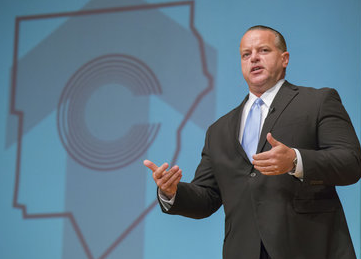Though Chris Ragsdale heads the second largest school district in the state, his new contract places him several spots under other metro Atlanta superintendents in terms of base pay.
Ragsdale was named Cobb’s permanent superintendent in February 2015 and was given a three-year contract at that time. That contract included a base salary of $275,000.
At its March 24 meeting, the Cobb school board unanimously approved an amendment to Ragsdale’s contract, extending it to March 23, 2019 — three years is the maximum length of a superintendent contract in Georgia.
The amendment also included an annual salary increase of $10,000 each year in March as long as Ragsdale receives a satisfactory evaluation from board members for that year.
“It was his idea,” Susan Thayer, school board chairwoman, said of tying Ragsdale’s pay raise to performance.
“Before, (his salary) was tied to the teacher salary schedule, which meant that any time he lobbied for a raise for teachers, he was technically lobbying for a raise for himself, and I don’t think he was comfortable with that. I think having him with a straight amount works better,” Thayer said.
Ragsdale received satisfactory marks from the board this year, Thayer said, which allowed his annual salary to go up to $285,000 on Wednesday. But at his new salary, he remains several spots behind his peers.
LARGE DISTRICTS = LARGE PAY
Several metro Atlanta superintendents draw base salaries at or near the $300,000 mark.
The state’s largest district, Gwinnett County Schools, pays its leader $299,809. J. Alvin Wilbanks has served as Gwinnett’s superintendent for 20 years. Gwinnett, which has 136 schools, has 176,923 students and about 22,000 employees, according to Sloan Roach, executive director of communication and media relations for the district.
By comparison, Cobb has 114 schools and 13,746 employees, while its student population of 112,708 is the second largest in the state.
But the state’s third-largest district pays its superintendent slightly more than the leaders of the state’s largest two systems. DeKalb County’s R. Stephen Green pulls in a $300,000 base salary. Green has served since July 1, 2015, the district that today has 101,389 students across 135 schools, said Quinn Hudson, DeKalb’s director of communications.
DeKalb employs about 14,000, Hudson added.
Fulton County Schools, the state’s fourth-largest district, is currently headed by interim Superintendent Kenneth Zeff, who has served since the middle of 2015 under a one-year contract with a base salary of $225,000, said Susan Hale, spokeswoman for the district.
But Fulton’s school board has named Jeff Rose, current superintendent of Beaverton School District in Oregon, the finalist for its superintendent position, and planned to offer Rose a contract on Thursday with a base salary of $295,000, Hale said. If Rose accepts, he would take office on June 1.
Rose has led Beaverton’s schools for the past five years. Prior to that, he spent three years heading the Canby School District, also in Oregon.
Ragsdale’s $285,000 salary puts him ahead of the superintendents of two neighboring districts. His counterpart at Marietta City Schools, Emily Lembeck, earns $198,081 annually. She has served as Marietta’s superintendent for 11 years. The district has nearly 8,900 students and 1,200 employees.
Ragsdale’s and Lembeck’s salaries top those of Cherokee County’s Brian Hightower, who took over as superintendent on Feb. 1. He earns a base salary of $185,000 as the school district’s leader, overseeing 4,500 employees and 41,000 students in 44 schools and centers, said Barbara Jacoby, spokeswoman for the district.
Benita Dodd, vice president of the Georgia Public Policy Foundation, said larger districts should merit a larger salary for their superintendents due to the challenges of running a larger system, but this is not always the case statewide. She added that size should not be the only factor school boards should make when considering a superintendent contract.
“It’s a competitive market, and obviously there’s more administration and oversight, and accountability expected of a superintendent of a bigger system,” Dodd said. “But there doesn’t seem to be any relation between academic achievement and superintendent salary, and we as taxpayers, and myself as a resident of Cobb County, would like to see that happen, but it’s almost like the more you shop superintendents around, the higher the price goes.”
Thayer said Cobb board members looked at the salaries of other superintendents when determining Ragsdale’s salary. They also looked at employees at other positions, from teachers to principals to cabinet staff when making determinations.
“We’re in different places in all of those salaries. It’s large, but we wanted our superintendent to be reasonably compensated compared to the others, just like we want our teachers to be under principals, so we’ve worked on everybody’s salary the last few years,” Thayer said.
Thayer said Cobb schools officials have made an effort to bring salaries reasonably close to the top salaries in the state. Due to the weight of his responsibilities, the superintendent should earn the district’s top salary, especially since Ragsdale helms a school district that operates with a budget of nearly a billion dollars, she said.
“Being a principal is probably one of the hardest jobs in the world, and being a superintendent is a little harder than that. When you look at education and compare it to industry, it takes the same skills or more to run a large school system, and we operate with more funds than most CEOs of companies, and he’s not paid comparably to those, and (he) never will be,” she said. “It’s certainly a challenging job and we expect a lot of him, and we want him to be compensated.”
Dodd said the comparison between the positions of superintendent to CEO, some of the latter of which can earn salaries of millions, was not apt.
“I don’t think that it’s an appropriate comparison, because school superintendents are basically public servants, I would say,” Dodd said. “You can’t expect outrageous salaries for them — it has to be reasonable and explainable, justifiable. This is government, this is not private enterprise.”
Reprinted from the Marietta Daily Journal, April 3, 2016. Article written by Jon Gargis.







